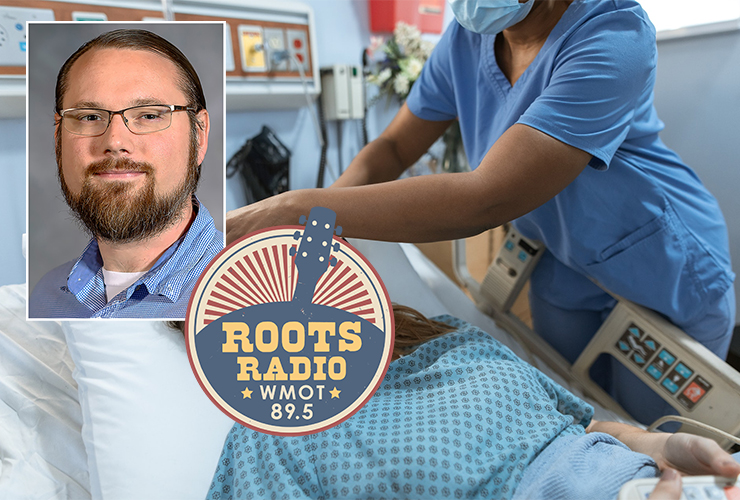
Dr. James Loveless, an assistant professor of psychology shown in the inset photo, is the guest on the Aug. 10 “MTSU On the Record” radio program, where he discusses a recent study he co-authored looking at ways for health care professionals to decrease the likelihood of violence in the workplace. (MTSU photo of Loveless; background photo by RODNAE Productions from Pexels)
Research into a new, proactive way of dealing with patients and others who get out of control in medical facilities was the subject of a recent “MTSU On the Record” radio program.

Dr. James Loveless

Gina K. Logue
Host Gina Logue’s interview with James Loveless, an assistant professor of psychology, first aired Aug. 10 on WMOT-FM Roots Radio 89.5 and www.wmot.org.
You can listen to their conversation via the SoundCloud link above.
Loveless is the co-author of a study of a way for health care professionals to decrease the likelihood of violence in the workplace. The emphasis was on training workers on ways to prevent and manage difficult patient behaviors.
After training 46 staffers at a major hospital, researchers divided them into an intervention unit and a comparison unit that did not implement the new training.
Over a three-month period of observation, the study noted, behavioral emergencies decreased by 50 percent in the intervention unit and increased 142 percent in the comparison unit.
“Good health care delivery rests on collaboration between …the health care provider and the patient who’s receiving the care,” Loveless said. “It doesn’t matter how good a cardiologist you are, how good a psychiatrist you might be. If your patient isn’t going to consent … to do the things you’re asking them to do, you can’t help them.”
The study was published earlier this year in the Journal of Clinical Psychology in Medical Settings.
 To hear previous “MTSU On the Record” programs, visit the searchable “Audio Clips” archives at www.mtsunews.com.
To hear previous “MTSU On the Record” programs, visit the searchable “Audio Clips” archives at www.mtsunews.com.
For more information about the radio program, contact Logue at 615-898-5081 or WMOT-FM at 615-898-2800.

COMMENTS ARE OFF THIS POST